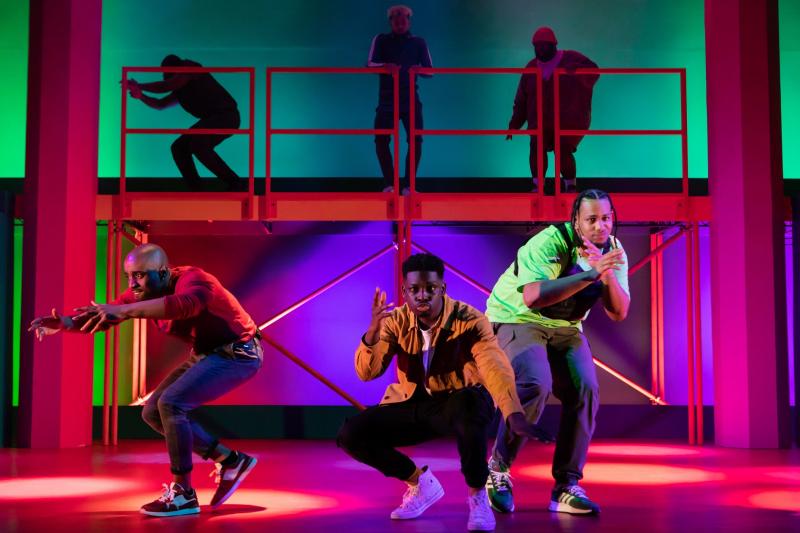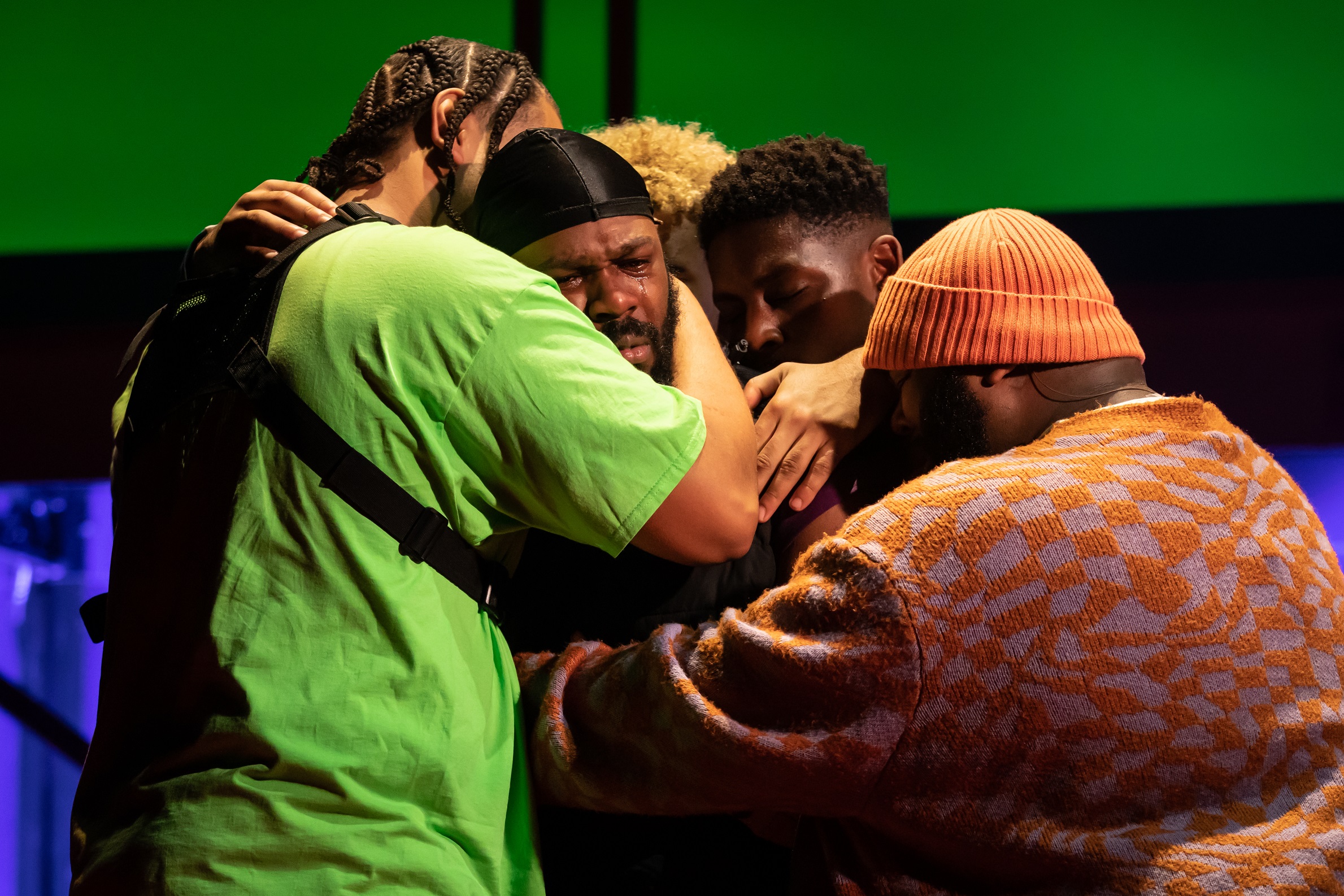For Black Boys Who Have Considered Suicide When the Hue Gets Too Heavy, Apollo Theatre review - a turbo-charged, game-changing piece of theatre | reviews, news & interviews
For Black Boys Who Have Considered Suicide When the Hue Gets Too Heavy, Apollo Theatre review - a turbo-charged, game-changing piece of theatre
For Black Boys Who Have Considered Suicide When the Hue Gets Too Heavy, Apollo Theatre review - a turbo-charged, game-changing piece of theatre
A terrific ensemble make an exhilarating plea for Black boys with blighted lives

For a show that comes with a trigger warning about the themes of racism, gang violence, toxic relationships, sexual abuse, child abuse, domestic violence and suicide it will tackle, For Black Boys… is unexpectedly joyful.
Its thorny subjects are packaged into an exhilarating whirl of music, dance moves and punchy dialogue, performed by a gifted cast of six. But at its heart is a solemn shout-out for a better understanding of Black boys with blighted lives, “miseducated and misunderstood”. As we watch, they learn, crucially, what it would take to love themselves.
Ryan Calais Cameron, who also directs this staging, wrote the piece as a male companion piece to Ntozake Shange’s For Colored Girls Who Have Considered Suicide When the Rainbow Is Enuf, a 1976 piece she dubbed a choreo-poem. It has come to the West End via the Royal Court and New Diorama.
The staging is simple but stunning. The six actor-singer-dancers, in casual gear, first appear to a moody sax solo, stacked in a blue-lit pile of interlocked bodies that slowly unravels and writhes, much as the boys will untangle the knots tie-ing them down. They have handles that connote blackness (Jet, Obsidian, Pitch, Midnight, Sable, Onyx) but are now In an empty, vibrantly coloured space where they can act out their psychodramas and stories, some sweet and funny, others brutal or tearfully confessional. The lyrics on their favourite tracks coax them to voice their feelings or inspire them to launch into turbo-charged dance routines from videos of the tracks we are hearing. (Choreography is by Theophilus O Bailey. I could have watched the cast dance for as long as they had the stamina.)
The earliest story comes from Jet (Nnabiko Ejimofor) at six years old, wondering why all the girls in his class fancied a white boy, not him, as the other five actors hilariously portray the dizzy six-year-old girls playing kiss-chase. He tells his mother he wants to be White/right/light/liked. “What!?” howl the others, who pile in with their own viewpoints. Via this kind of process, the boys arrive at the big flashpoints in their lives. School and church or street-life? Wage-earner or Badman? One woman or none? Straight or gay? Does the N-word empower or destroy? Live or die?
Obsidian (Aruna Jalloh), the best educated of the group, thinks Black boys should study their pre-slavery history to find role models. His hero as a kid, he reveals, was an all-conquering Moor called Tariq, whom he deployed to do the bold things he didn’t dare to. Midnight (Kaine Lawrence) doesn’t believe Africans once ruled a big chunk of Europe, but then, he doesn’t read books and associates black history with being made to watch the miseries of slavery in Roots as a kid.
The police make an inevitable appearance. Sable (Darragh Hand) recalls discovering he was scary when he was stop-and-searched in Hackney at 13 and wondered what on earth he'd done. Tough-guy Onyx (a poignant Mark Akintimehin) tuts an answer, obvious to him: “Being black and aged 13 to 100.” Does the black community need more authoritative policing, as Pitch (Emmanel Akwafo) suggests? Onyx chews him out too: "If we need them, we’ll call them, innit!” (Huge cheer and applause from the audience at this line.) Onyx (pictured above, centre), in a great piece of writing in which he and Jet talk about their dads in almost the same terms but arrive at vastly different punchlines, traces his rise from brutalised boy who left home at 13 to weed-smoking gangsta who treats women as mere fuel. “Black man don’t fall in love,” he insists. Jet’s “perfect” father, on the other hand, sacrificed himself to his male pride, unable to tell his family he had cancer for three years. “I had to choose between my health and being a man.”
Onyx (pictured above, centre), in a great piece of writing in which he and Jet talk about their dads in almost the same terms but arrive at vastly different punchlines, traces his rise from brutalised boy who left home at 13 to weed-smoking gangsta who treats women as mere fuel. “Black man don’t fall in love,” he insists. Jet’s “perfect” father, on the other hand, sacrificed himself to his male pride, unable to tell his family he had cancer for three years. “I had to choose between my health and being a man.”
Midnight’s biggest trauma erupts finally when he boasts about losing his virginity at nine, a story that is not what it seems; he has been left impotent and fatally low on self-esteem. Sable has parlayed his lighter, mixed-race skin into an endless round of sexual encounters: “Every woman loves chocolate… especially that Caramel Crunch.” That’s what being a man is, he believes.
At first sight, Pitch’s story is the least sombre. In a terrific turn by the roly-poly British-Ghanaian Akwafo, he confesses he used to pretend he was from St Kitts or the Virgin Islands as Caribbeans were so much cooler. But he has been reduced to wondering whether he is an Oreo, as a white girl called him approvingly: white inside and not Black enough to be Black.
What emerges from all the chat is a terrible truth: these boys are oppressed not just by majority white culture but also by their own. Church has been the only guiding light for some of them (Ejimofor does a barnstorming number as a fire-breathing Black pastor exhorting his congregation, “Blow your trumpet”). Mothers have proved unreliable or unavailable, fathers even more so. The boys have been fed the image of tough Black men, and bought into it. Obsidian, though, has been moved to ask whether he is “a different type of Black” because he shies away from conflict. He heartbreakingly describes looking deep into a scared Black boy’s eyes and seeing what hell looks like, “living life with death by his side”.
In the closing stretch, the boys relate what drove them to suicidal thoughts and offer a prayer for help, tellingly delivered in unison. It’s a powerful and moving finale that never goes over the top but is kept at a steady burn that sears the brain more effectively. A total triumph, and a game-changer for the West End.
rating
Explore topics
Share this article
The future of Arts Journalism
You can stop theartsdesk.com closing!
We urgently need financing to survive. Our fundraising drive has thus far raised £49,000 but we need to reach £100,000 or we will be forced to close. Please contribute here: https://gofund.me/c3f6033d
And if you can forward this information to anyone who might assist, we’d be grateful.

Subscribe to theartsdesk.com
Thank you for continuing to read our work on theartsdesk.com. For unlimited access to every article in its entirety, including our archive of more than 15,000 pieces, we're asking for £5 per month or £40 per year. We feel it's a very good deal, and hope you do too.
To take a subscription now simply click here.
And if you're looking for that extra gift for a friend or family member, why not treat them to a theartsdesk.com gift subscription?
more Theatre
 Hedda, Orange Tree Theatre review - a monument reimagined, perhaps even improved
Scandinavian masterpiece transplanted into a London reeling from the ravages of war
Hedda, Orange Tree Theatre review - a monument reimagined, perhaps even improved
Scandinavian masterpiece transplanted into a London reeling from the ravages of war
 The Assembled Parties, Hampstead review - a rarity, a well-made play delivered straight
Witty but poignant tribute to the strength of family ties as all around disintegrates
The Assembled Parties, Hampstead review - a rarity, a well-made play delivered straight
Witty but poignant tribute to the strength of family ties as all around disintegrates
 Mary Page Marlowe, Old Vic review - a starry portrait of a splintered life
Tracy Letts's Off Broadway play makes a shimmeringly powerful London debut
Mary Page Marlowe, Old Vic review - a starry portrait of a splintered life
Tracy Letts's Off Broadway play makes a shimmeringly powerful London debut
 Little Brother, Soho Theatre review - light, bright but emotionally true
This Verity Bargate Award-winning dramedy is entertaining as well as thought provoking
Little Brother, Soho Theatre review - light, bright but emotionally true
This Verity Bargate Award-winning dramedy is entertaining as well as thought provoking
 The Unbelievers, Royal Court Theatre - grimly compelling, powerfully performed
Nick Payne's new play is amongst his best
The Unbelievers, Royal Court Theatre - grimly compelling, powerfully performed
Nick Payne's new play is amongst his best
 The Maids, Donmar Warehouse review - vibrant cast lost in a spectacular-looking fever dream
Kip Williams revises Genet, with little gained in the update except eye-popping visuals
The Maids, Donmar Warehouse review - vibrant cast lost in a spectacular-looking fever dream
Kip Williams revises Genet, with little gained in the update except eye-popping visuals
 Ragdoll, Jermyn Street Theatre review - compelling and emotionally truthful
Katherine Moar returns with a Patty Hearst-inspired follow up to her debut hit 'Farm Hall'
Ragdoll, Jermyn Street Theatre review - compelling and emotionally truthful
Katherine Moar returns with a Patty Hearst-inspired follow up to her debut hit 'Farm Hall'
 Troilus and Cressida, Globe Theatre review - a 'problem play' with added problems
Raucous and carnivalesque, but also ugly and incomprehensible
Troilus and Cressida, Globe Theatre review - a 'problem play' with added problems
Raucous and carnivalesque, but also ugly and incomprehensible
 Clarkston, Trafalgar Theatre review - two lads on a road to nowhere
Netflix star, Joe Locke, is the selling point of a production that needs one
Clarkston, Trafalgar Theatre review - two lads on a road to nowhere
Netflix star, Joe Locke, is the selling point of a production that needs one
 Ghost Stories, Peacock Theatre review - spirited staging but short on scares
Impressive spectacle saves an ageing show in an unsuitable venue
Ghost Stories, Peacock Theatre review - spirited staging but short on scares
Impressive spectacle saves an ageing show in an unsuitable venue
 Hamlet, National Theatre review - turning tragedy to comedy is no joke
Hiran Abeyeskera’s childlike prince falls flat in a mixed production
Hamlet, National Theatre review - turning tragedy to comedy is no joke
Hiran Abeyeskera’s childlike prince falls flat in a mixed production
 Rohtko, Barbican review - postmodern meditation on fake and authentic art is less than the sum of its parts
Łukasz Twarkowski's production dazzles without illuminating
Rohtko, Barbican review - postmodern meditation on fake and authentic art is less than the sum of its parts
Łukasz Twarkowski's production dazzles without illuminating

Add comment